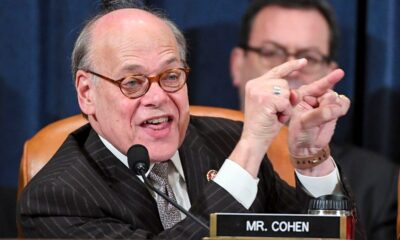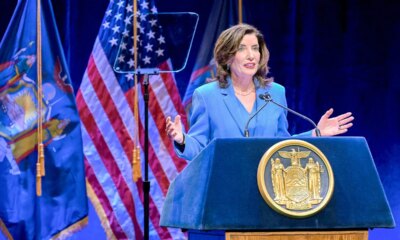This should be easy. Confirmation that Kamala Harris is sane and sentient would — in an ideal world — be more than enough for her to beat Donald Trump in Tuesday night’s debate.
Trump’s flaws are too well known to need rehearsing. Even Dick Cheney — nobody’s idea of a liberal — has announced that he will be voting for Harris. The former Republican vice-president labelled Trump as the greatest threat to the American republic in its 248-year history.
But the reality is that Harris needs to do much more than give an adequate performance. The last major poll taken before the debate suggested that Trump now has a one-point lead over Harris.
Of course, the New York Times/Siena poll is just one of many. Other polls in recent weeks have tended to suggest that Harris has a slim advantage in the popular vote — with the crucial swing states mainly too close to call. But given the bias against the Democrats in the electoral college system, Harris needs to be several points ahead in the popular vote to be sure of winning. And no polls suggest that she has yet established that kind of lead.
So the Harris camp has reason to be worried. The surge in excitement and support that she generated after replacing Joe Biden at the top of the ticket in July is dissipating.
The hopes that Harris would get a real bounce in the polls after the Democratic convention — and open up a substantial lead over Trump — were not met. Reports of disarray in the Trump camp have not translated into a weakening in support for the Republican.
Could it be that Harris’s campaign has not been the brilliantly executed triumph portrayed by some pundits? One obvious weakness is that Harris has been very reluctant to risk straying off script, by giving interviews to the media. The first television interview that she did was in the company of her running mate, Tim Walz — which suggested a lack of confidence, as if the would-be president needed a chaperone to get through some rather gentle questioning.
Perhaps as a result many voters still feel they don’t know enough about Harris to make a proper judgment. In the recent poll some 28 per cent say they need to learn more about her; compared to just 9 per cent who want to learn more about Trump.
But that information gap also presents Harris with an opportunity. The debate gives her a chance to define herself for the many voters who will be getting their first good look at the Democratic candidate. Harris really needs to seize that opportunity. This Tuesday’s face-off with Trump may be her last real chance to shift the momentum of the race — since no further debates are yet scheduled.
Trump and the Republicans are trying hard to define Harris as a San Francisco liberal and a “DEI” candidate — who has risen to the top because she is a Black woman, rather than on merit. Harris should take the opportunity to underline that she has lived a much less privileged life than Trump, who was born into money and privilege.
Some 61 per cent of the voters say that they want to see “major change” after the Biden presidency. Harris has somehow to convince voters that she can represent that change, despite being Biden’s vice-president. Her proposal for price controls on some goods — while panned by many economists — may be the kind of eye-catching suggestion that actually resonates with Americans who are struggling with inflation.
Yet the history of presidential election debates also suggests that they often turn on a single one-line zinger. Ronald Reagan’s genial riposte to Jimmy Carter — “There you go again” — was retrospectively deemed to be a disarming masterstroke. In the 1988 vice-presidential debate, Lloyd Bentsen memorably squelched Dan Quayle, who had unwisely compared himself to John F Kennedy, by telling him — “Senator, you’re no Jack Kennedy.” (Michael Dukakis and Bentsen still lost the election to George HW Bush and Quayle.)
In June’s debate, Trump delivered the killer line that summed up Biden’s shocking deterioration — “I really don’t know what he said at the end of that sentence. I don’t think he knows what he said either.”
Who will win the 2024 presidential election? Join Gideon Rachman and colleagues for a subscriber webinar on September 12 to assess the candidates’ chances after their first debate. Register for your subscriber pass now at ft.com/uswebinar
That moment should serve as a reminder not to underestimate Trump’s abilities as a debater or a television performer. Biden’s debate performance was unexpectedly awful; but Trump also did unexpectedly well. While he delivered the usual stream of lies and non-sequiturs, he also came across as more disciplined and quicker on his feet than in some previous debates.
In keeping with her campaign’s strategy to define Trump as weird — and to come across as joyful, rather than angry — Harris may look for an opportunity to laugh at Trump, rather than to denounce him.
Hoping that Trump will self-sabotage with some horrible outburst — or for the opportunity to deliver a quick put-down — the Harris campaign argued for both candidates’ microphones to remain open throughout the debate. It lost that skirmish. So Harris will have to find another way to win the battle.
The uncomfortable truth is that if the polls do not shift sharply after Tuesday’s debate, Harris is probably heading for defeat and the US is heading for a second Trump presidency.
gideon.rachman@ft.com






































